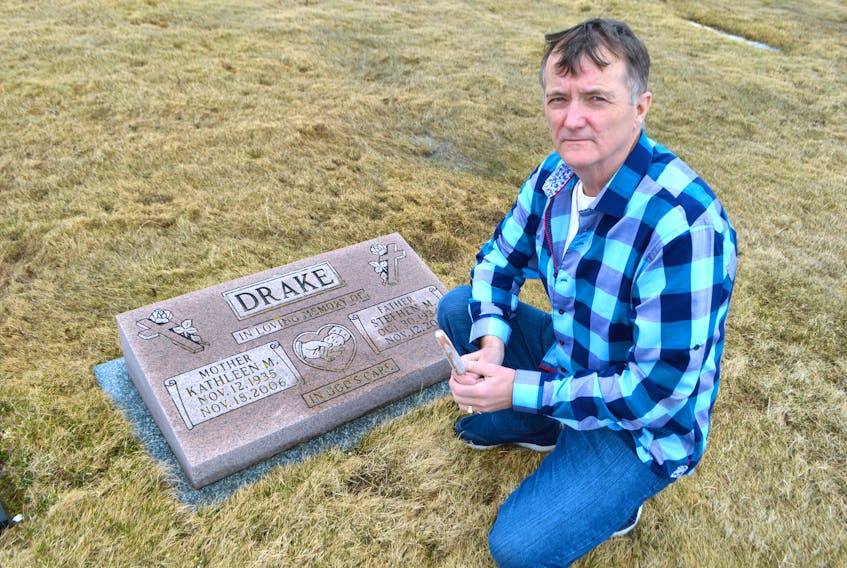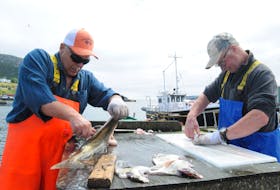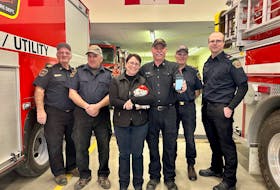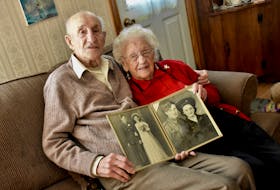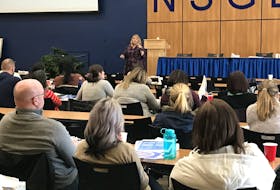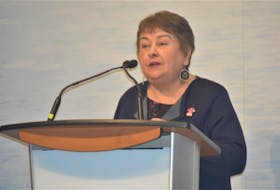NEW WATERFORD, N.S. — A son’s painful journey for answers to his father’s death began with a promise made over shared fudge sticks.
Steve Drake Jr. said he’s been fighting the incorrectly attributed cause of death the former Cape Breton District Health Authority (CBDHA) listed for his father Steve Drake Sr. concerning his premature death on Nov. 12, 2012.

“It was a wrong autopsy, at a wrong hospital by the wrong pathologist producing a wrong cause of death,” said the New Waterford man.
As a result, it kicked off an exhausting six-year journey for Drake Jr., who says he was up against two goliaths — the former Cape Breton District Health Authority (CBDHA) and Workers’ Compensation Board (WCB). What kept him going was a promise made to his father — over shared fudge sticks — that he wouldn’t let the WCB ignore another coal miner whose life was limited due to their severely damaged lungs.
“It took more than 2,109 days, 10 legal decisions and $108,000, but I kept that promise,” he said. “I call these my fight stats, as this was a fight. That’s the time, the energy and everything else to uncover the truth.”
But during his quest for answers, Drake Jr. said, he didn’t discover his father also died of a Clostridium difficile bacterial infection until two years after his death. Throughout his ordeal, he said, he also encountered major deficiencies and gaps in Nova Scotia Health Authority (NSHA) post-mortem care and now his goal is to see this system fixed so no other family will have to endure what he did.
“They’ve got two teams in place right now working on the fix that will be rolled out province-wide,” he said.
“They are rolling this out because of a promise I made to my father.”
Colin Stevenson, vice-president of health services, quality and system performance for the NSHA, said Drake Jr. approached them with concerns on how their organization relates to post-death care as well as what he identified as some gaps in the system.
As a result, Stevenson said, they have been working with him on his experience and concerns. He said they are implementing changes in some practices and policies with post-mortem care in the eastern zone and are “absolutely” looking at also doing so province-wide.
Many of the concerns stemmed from care with the CBDHA, a different organization, he added.
“In looking at what has been done in the eastern zone we will look across the province and decide to take it further, if there are other things we can change.”

The promise
Steve Drake Sr., a coal miner for 39 years, was diagnosed with coal workers lung disease in 1971.
Drake Jr. said when the effects of working in the pit for nearly four decades started to get to his father, he got around less frequently. It became more common to see him on his deck on Drake Street — wearing his trademark lumberjack shirt and green work cap — waving to neighbours.
Drake Sr. was also noted for having a freezer full of fudge sticks, a favourite frozen treat in his later years.
One day while having a couch talk — fudge sticks in hand — Drake Jr. saw that his father was extremely short of breath and struggling for air.
That’s the moment Drake Sr. made his son promise his lungs would be autopsied when he died.
Drake Jr. said he was well aware of the struggles coalminers have endured for decades, fighting with the WCB over lung disease. He had helped many on that issue over the years and didn’t like how they treated coal miners.
“I had a lump in my throat,” Drake Jr. said. ‘I said, ‘I promise, Da, I’ll stand up for you. I won’t let workers compensation treat you like just another dead coal miner.’
“That’s the promise I made to my father.”
Clostridium difficile
On March 18, 2011, an outbreak of the C. difficile bacteria was officially declared in seven of nine hospitals in the CBDHA and on Dec. 22, 2011, a second C. difficile outbreak was confirmed.
The Public Health Agency of Canada identified from Jan. 1 to May 6, 2011, this multi-site outbreak in Cape Breton resulted in 64 confirmed CDI cases diagnosed, with 49 classified as health-care associated C. difficile cases. Eleven deaths were associated in some way with the outbreak and the direct cause of death for five patients.
On Feb. 3, 2012, the CBDHA declared the outbreak to be over.
“The CBDHA declared the outbreak over but Dr. Shoaib Ansari stated, ‘There will likely be another outbreak, we will never get rid of it,’” Drake Jr. noted.

Steve Drake Sr.
Between July 2012 and October 2012, Drake Sr. had been admitted to multiple CBDHA hospitals — identified as Clostridium difficile-infected sites — including the Glace Bay Hospital, New Waterford Consolidated Hospital, Cape Breton Regional Hospital and finally the Harbourview Hospital, due to a broken hip.
When Drake Sr. arrived home from hospital, he grew weak and developed diarrhea.
After suffering for several weeks, on Oct. 27, 2012, Drake Sr. collapsed at home. He was rushed to the Glace Bay Hospital and was later transferred to the New Waterford Consolidated Hospital.
On Oct. 30, 2012, Drake Sr. turned 78. Family celebrated in hospital with cards and gifts and shared birthday cake with staff. Drake Jr. said the care by hospital staff was always loving and exceptional
“They took really good care of my father in there.”
Drake Sr. wasn’t on a special diet.
“He had fudge sticks in the hospital,” he said. “If he wanted something it didn’t matter what it was, we would bring it in to him.”
Drake Sr. began suffering uncharacteristic seizures. On Nov. 10, after suffering a seizure, he became unresponsive. On Nov. 12, 2012, he died in hospital at 2:21 a.m.
“When he went in he was OK,” said Drake Jr. “Fifteen days later, my father was dead. There was no injury, he wasn’t supposed to die.”
“It was a wrong autopsy, at a wrong hospital by the wrong pathologist producing a wrong cause of death.” – Steve Drake Jr.
The questions begin
On Nov. 12, 2012, Drake Jr. had a frank discussion with his father’s doctor about his father’s wishes — a complete autopsy with an examination of both lungs for workers compensation purposes.
“I thought it was a simple request,” he said. “I was wrong.”
The problems surfaced right away. Drake Jr. said the last attending physician didn’t immediately contact the Medical Examiner Service (MES), a breach of the Fatality Investigations Act. Hospital staff also failed to immediately contact the WCB, a breach of the Workers’ Compensation Act.
“Because my father’s condition was workers’ compensation-related, by law the CBDHA was to contact the medical examiner.”
Drake Jr. said the physician didn’t contact the MES until the next day and it was incorrectly suggested as not being a workers’ compensation matter. As a result, his father’s remains were transported to Cape Breton Regional Hospital for a clinical autopsy.
“They (the physician) had contacted the medical examiner when my father was on the table getting an autopsy done,” Drake Jr. said.
He also realized the autopsy authorization form was outdated, another breach of the Fatality Investigations Act. He said the form was poorly designed and used misleading language that could cause a breach of an injured worker’s right to a full forensic autopsy.
And it did. Instead, Drake Jr. said, a clinical autopsy was performed on his father.
“As a result of that outdated form and a mistake by the doctor, my father was streamed to the wrong hospital for the wrong autopsy by the wrong pathologist.”

Not about to stop
Drake Jr., a senior Crown prosecutor at the Sydney Justice Centre, sits in his immaculate kitchen, his faithful yellow Labrador retriever, Rosey, by his side. As he speaks with pride at one point about being a fourth-generation coal miner, he lowers his head, fighting back emotions that had arisen as he recalled how his six-year battle for his father now got underway.
On March 27, 2013, the CBDHA clinical pathologist signed the autopsy report. The lungs weren’t on the list of clinical findings. There was no cause of death listed.
On June 10, 2013, the CBDHA clinical pathologist signed a second “addendum” autopsy report, but again no cause of death was provided.
In October 2013 and again in January 2014, Drake Jr. continued pursuing the absence of cause of death on the reports. He was finally told the cause of death was heart-related with lungs a contributing factor and referred to a lung pathologist for clarification on the impact it had on his father’s death.
“Both pathologists declined to provide written confirmation of cause of death,” Drake Jr. said. “They said it wasn’t their job.”
Drake Jr. said the lung pathologist’s report that revealed the condition of his father’s lungs got stuck on a shelf in the lab in Sydney for five months.
“This was an urgent thing. It’s infuriating.”
Medical examiner steps in
On Jan. 7, 2014 Drake Jr. contacted the Medical Examiner Service with questions on absence of cause of death on the autopsy report but was advised it was not an MES case. The WCB went with the CBDHA’s records and, on March 3, 2014, denied any connection between his father’s severely damaged lungs and death.
“I appealed decision after decision after decision.”
Memories kept him going.
Drake Jr. said one of his grandfathers lost both legs working in the coal mines when he was only 37. His father went to work in the mines at age 15, faking his birth certificate.
His strong work ethic was even revealed in his family life.
Growing up, Drake Jr. said, his mother was very ill and spent a lot of time in the hospital.
“My father raised us alone back in the 1960s, a time when being a single parent wasn’t cool,” he said. “There were four of us; Patrick was just a baby.”

***
Drake Jr. wrote his father this poem, inscribed on a plaque with a metal background. He and his siblings presented it to their father on his birthday on Oct. 30, 1988, in celebration of his retirement after 39 years working underground.
‘DAD’ WE REMEMBER WHEN
You gave up your youth to toil in the mine,
So we could have what you could not.
You worked underground, day and night,
Watching us grow from far away.
You raised us well by yourself,
A provider who asked for nothing.
You were strong when we did not understand,
The sculptor who made us what we are today.
***
Nova Scotia Health Authority
On April 1, 2015, the CBDHA was one of nine district health authorities that amalgamated into the NSHA. Now, Drake Jr. was going after the NSHA for answers. On April 8 and April 9, 2015, a NSHA pathologist responded to further requests from Drake Jr., providing cause of death as ischemic heart disease with lungs not a contributory factor to death.
On July 27. 2015, Drake Jr. again contacted the Medical Examiner Service and this time was informed of mistakes that had been made and that this had been an MES case all along.
Chief Medical Examiner Dr. Matthew Bowes took jurisdiction over the case and conducted a “death investigation.”
On March 2, 2016, Bowes certified immediate cause of death as complications of C. difficile diarrhea with simple coal workers pneumoconiosis, atherosclerotic coronary artery disease and chronic kidney disease contributing. Bowes released an amendment to Drake Sr.’s death certificate.
Drake Jr. immediately provided Bowes’ report and death certificate to the NSHA and the WCB, but both organizations refused to accept Dr. Bowes’ opinion or certification of the cause of death as conclusive.
“They both stonewalled me,” he said. “They basically told me to go away.”
Bowes declined an interview with the Cape Breton Post for this story. However, in an email exchange with Drake Jr., he stated the pathologist had no authority to make this determination and should have deferred to him.
“The only relevant death certificate is the one I issue when I have taken jurisdiction over a case,” Bowes wrote in the email. “All previous death certificates are made obsolete.”
In the meantime, Drake Jr. was also a bit shocked seeing C. difficile on the report and began digging into the earlier outbreak in CBDHA hospitals.
More digging
Drake Jr. discovered that, when his father was last admitted to the hospital, records acknowledged diagnosis of coal miners lung disease, but lab tests also identified the presence of C. difficile antigens/toxins.
“He got it from one of those four admissions prior, all which had been identified as affected sites,” Drake Jr. said.
Records also showed Drake Sr. was being given Vancomycin and Metronidazole, treatments for patients with C. difficile infection.
“Not only did he come in with it and they diagnosed it, but then they treated him for C. difficile,” Drake Jr. said.
Researching further, he discovered on Nov. 14, 2012, — two days after his father’s death — that Diane Calvert Simms, CEO of the CBDHA at the time, told the Nova Scotia legislature's public accounts committee 14 of 20 of the provincial auditor general's recommendations on infection control had been met and the remainder would soon be implemented. At the same session, former deputy health minister Kevin McNamara said his department was monitoring the health authority's progress and reported significant improvements in hygiene practices.
“Looking back, I discovered that, on that day they were there bragging about slaying the C. difficile dragon, I was writing my father’s obituary in my basement.”
The fight continues
On Oct. 5, 2016, a NSHA pathologist responded to Drake’s submissions of Bowes’ certification of cause of death. The pathologist confirmed an earlier opinion that ischemic heart disease was the cause of death.
On Jan. 17, 2017, Drake Jr. wrote to the then eastern zone medical executive director, Dr. Jeremy Hillyard, pleading for intervention.
On March 24, 2017, the NSHA engaged services of a different clinical pathologist to review the case. On May 16, 2017, Drake Jr. wrote to Nova Scotia Premier Stephen McNeil and former health and wellness minister Leo Glavine, asking them to intervene.
“I wanted them to admit my father died of C. difficile and coal workers pneumoconiosis, as found by the chief medical examiner,” he said. “Neither one even acknowledged the letter.
“They were making me angry now.”
Then on April 20, 2018, the NSHA provided Drake Jr. with a clinical pathologist’s opinion that Dr. Bowes’ conclusion that C. difficile was the cause of death was incorrect.
In a review into the death and post-mortem care of Drake Sr., Dr. Mathieu Castonguay, of the NSHA Department of Pathology and Laboratory Medicine, listed “hypertensive heart disease” as the major diagnostic finding at autopsy. Drake Jr. said it’s difficult to believe that the NSHA wouldn’t listen to the chief medical examiner for Nova Scotia.
“I feel the NSHA simply didn’t want it out there that the C. difficile existed in the hospitals at a time when they said it was over.”
But the pathologist’s report did agree with the finding of Dr. Bowes that the condition of his lungs contributed to Drake Sr.’s death.
“I’m then told by Dr. Warren Wilkes, the new NSHA Eastern Zone director, that there will be no further review into my father’s autopsy or services provided by the pathology department at that time,' he said.
“They slammed a door in my face, they stopped returning my calls and wouldn’t return my emails.”

Fight never faded
Drake Jr. went home, pulled out his father’s files and started reviewing them again from the beginning. The first binder Drake Jr. had put together while pursuing this had a plastic sleeve on the front, where he had placed his father’s obituary. When things got tough he’d look at it.
“Every once in a while, I’d look at that and say, ‘Dad I’m getting them, I’m not stopping,’” he said. “Then I’d get focused again.”
At long last,on Aug. 21, the WCB conceded that the workplace lung condition contributed to the death of Drake Sr.
Although Drake Jr. has enjoyed telling many fudge sticks stories that concern his father over the years, his favourite was when he got this final decision.
“I went up to my father’s grave,” he said. “I sat and had a fudge stick with him and I talked, I laughed, I cried.”
But because the NSHA wouldn’t accept Dr. Bowe’s findings, it cost him another six months of his life.
“Exhausting and disrespectful,” he said with his voice breaking with emotion. “They were telling me to go away and to not go them with my father’s death.”
"They slammed a door in my face, they stopped returning my calls and wouldn’t return my emails.” – Steve Drake Jr.
Getting ready to go again
After spending months reviewing his father’s files again, on Nov. 12, 2018 — an anniversary of his father’s death — Drake Jr. sent a legal brief to Janet Knox, chief executive officer and president of the NSHA.
Drake Jr. said he has never played the legal card as that’s not his style, but this time there was a difference. Six years had gone by.
“I signed it Stephen J. Drake, barrister and solicitor.”
On Feb. 6, 2019, he said the NSHA conceded in writing they would be amending the cause of death on his father’s death certificate.
“The only time I sent a legal letter signed ‘barrister and solicitor,’ is the only time I got a legitimate response from the NSHA.”

Pain and exhaustion
The pain and exhaustion inside Drake Jr. can’t be measured.
But something else can.
Drake Jr. said, stacking all binders and documents with his six-year fight came to 56 inches high.
He said it took 600 combined legal hours over six years to fight the WCB, the CBDHA and the NSHA, a cost he was able to self-absorb with his law background. However, the bill would likely surpass more than $150,000 for someone else without a legal background embarking on the same quest.
“What person in Nova Scotia could pay a lawyer to fight this fight?” Drake Jr. asked.
As he now waits for changes to post-mortem care to roll out with the NSHA, he does have a memento of his fight close by.
“I have a photo of that day WCB conceded — having my fudge stick at Da’s grave.”
PART 2: Coal miner's son kept his vow, he's watching to see Nova Scotia Health Authority keeps promise on post-death care

TIMELINE
Key dates in Steve Drake Jr.’s fight for answers.
March 18, 2011
First of two Clostridium difficile outbreaks officially declared in seven of nine Cape Breton District Health Authority hospitals.
Feb. 3, 2012
CBDHA declares C. difficile outbreak over. Six deaths linked with hospital-acquired infection since mid-December 2011.
July and October 2012
Steve Drake Sr. admitted to multiple CBDHA hospitals identified as C. difficile-infected sites.
Oct. 27, 2012
Steve Drake Sr. admitted to hospital after collapse at home. Laboratory tests confirm presence of C. difficile antigens/toxins.
Nov. 12, 2012
Steve Drake Sr. passed away at the New Waterford Community Hospital. Son Steve Drake Jr. requests autopsy, including both lungs, for workers compensation purposes.
Nov. 13, 2012
Remains mistakenly released for transport to Cape Breton regional Hospital for clinical autopsy.
March 27, 2013
CBDHA clinical pathologist signs autopsy report. No cause of death provided.
Jan. 7, 2014
Drake Jr. questions Medical Examiner Service on absence of cause of death on autopsy report.
March 3, 2014
Workers’ Compensation Board denies any connection between lung condition and death.
April 8 & 9, 2015
One of numerous pathologist reports providing cause of death as ischemic heart disease.
July 27 & 28, 2015
Drake Jr. requests investigation by Chief ME Dr. Matthew Bowes.
March 2, 2016
ME lists cause of death as complications of C. difficile diarrhea with simple coal workers pneumoconiosis contributing to death.
March 2016
NSHA and WCB refuse Bowes’ cause of death as conclusive.
Aug. 21, 2018
WCB concedes workplace lung condition contributed to the death of Drake Sr.
Feb. 6, 2019
NSHA concedes cause of death warranted correction.
July 2019
NSHA continues to roll out changes to post mortem care province wide as a result of gaps and deficiencies Drake Jr. says he found.

